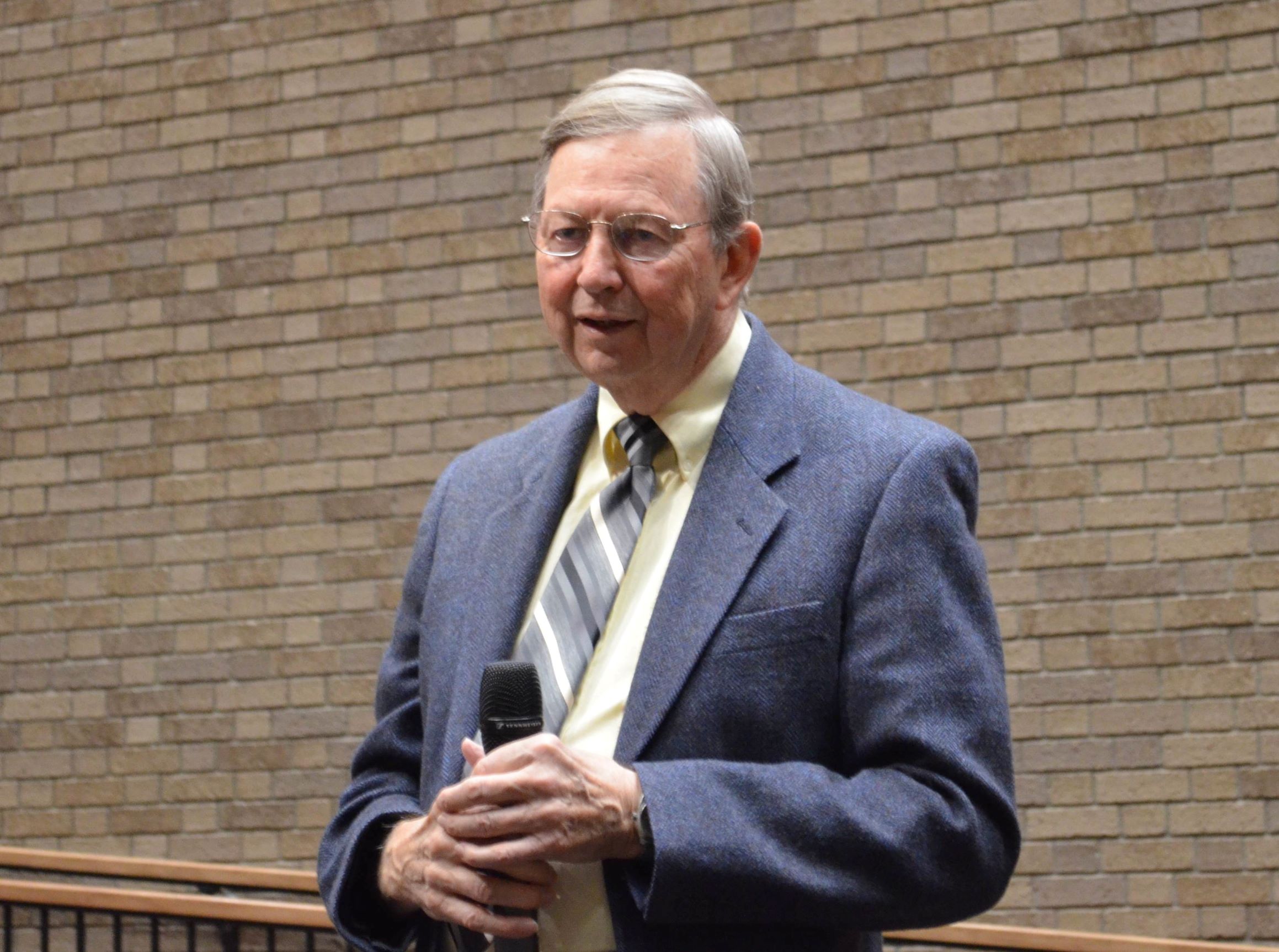To put Mahatma Gandhi’s teachings on nonviolence into practice, it is best to study the root causes of violence, the Rev. James J. Bacik said in a Nov. 4 lecture at the University of Toledo.
In the sixth annual Gandhi Lecture for Peace and Nonviolence, Bacik told the crowd of 250 in McQuade Law School Auditorium on Sunday (Nov.4) that human nature, selfish desire and sociopolitical oppression are key factors that lead to violence.
The retired Toledo Catholic priest, a theologian, author and scholar who now teaches at Catholic Theological Union in Chicago, also said Gandhi stressed the need for interreligious dialogue and participation in nonviolent resistance as means of countering the causes of violence and enacting change.
In opening his hour-long lecture, Bacik, as usual forsaking a clerical collar for sport coat and tie and speaking fluidly without notes, said French philosopher René Girard recognized that “mimetic desire,” in which a person wants something that another possesses, is a leading cause of violence.
“It’s like the story of little kids in a room playing with toys. There’s a bunch of toys, but if another little kid walks in he’s going to want the toy that that kid’s playing with,” Bacik said.
Of interest to Gandhian philosophy, he said, is that people who desire someone else’s possessions often create scapegoats on whom to blame their problems. Understanding this tendency helps in the quest for peacemaking, Bacik said.
He said Gandhi, who was born in Gujarat, India, on Oct. 2, 1869, and assassinated by a Hindu extremist in Delhi on Jan. 30, 1948, sought self-realization, which is integral to Eastern culture, rather than the quest for self-fulfillment that drives much of Western society.
“He was introspective. He tried to understand what made him tick,” Bacik said.
Gandhi fasted and prayed diligently, and in his 30s took a vow of chastity (without first consulting his wife) in hopes that mortifying the flesh would give him more strength for peace and justice.
Another important lesson from Gandhi is “to see the commonness of the human situation,” Bacik said. Everyone is at fault in some way or another, and it is dangerous when one group considers itself superior to others. Such an attitude can lead to dehumanization, discrimination and even genocide, he said.
He said Catholic teaching holds that “salvation is open to all people, not just a few,” as long as people “follow their conscience.”Such a belief erases any sense of superiority.
Recognizing that socioeconomic oppression is another major cause of violence, Gandhi sought to end India’s social caste system, Bacik said.
He said that if he were to be reincarnated he wanted to come back as an untouchable — India’s lowest social class. He sought to bring Muslims and Hindus together for dialogue, but because those efforts failed and the rift between the groups was not healed, Gandhi refused to join in celebration of India’s independence in 1947.
During a question-and-answer session, Bacik was asked if he thought the Catholic church would ever make Gandhi a saint.
“Not under the present pontiff,” Bacik replied. But he said that in the early church, before formal canonization, holy people were made saints “by acclamation,” and by that standard Gandhi “already is a saint for many people.”
When someone asked about Gandhi’s teachings on marriage, Bacik said the Indian leader “was not a good guide on marriage.” He was patriarchal to his wife, whom he married through an arranged marriage, and took a vow of chastity without even talking to her about it, he said.
✯David Yonke is the editor and community manager of Toledo Faith & Values (ToledoFAVS.com), a website that provides in-depth, nonsectarian news coverage of religion, faith and spirituality in the Toledo area.























